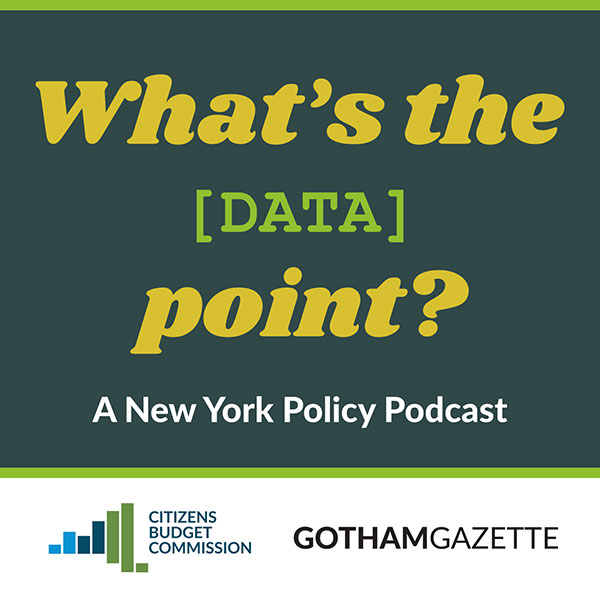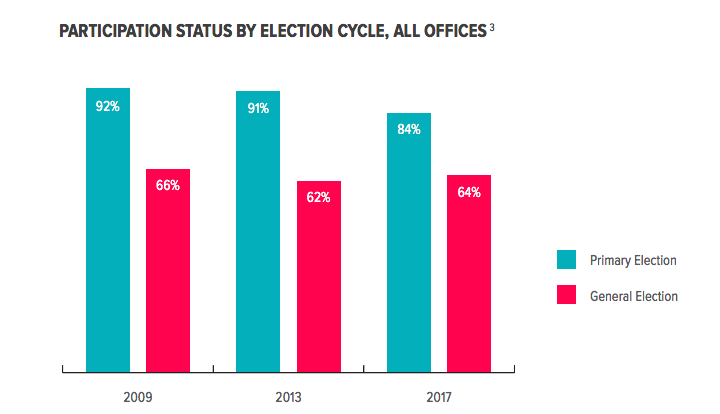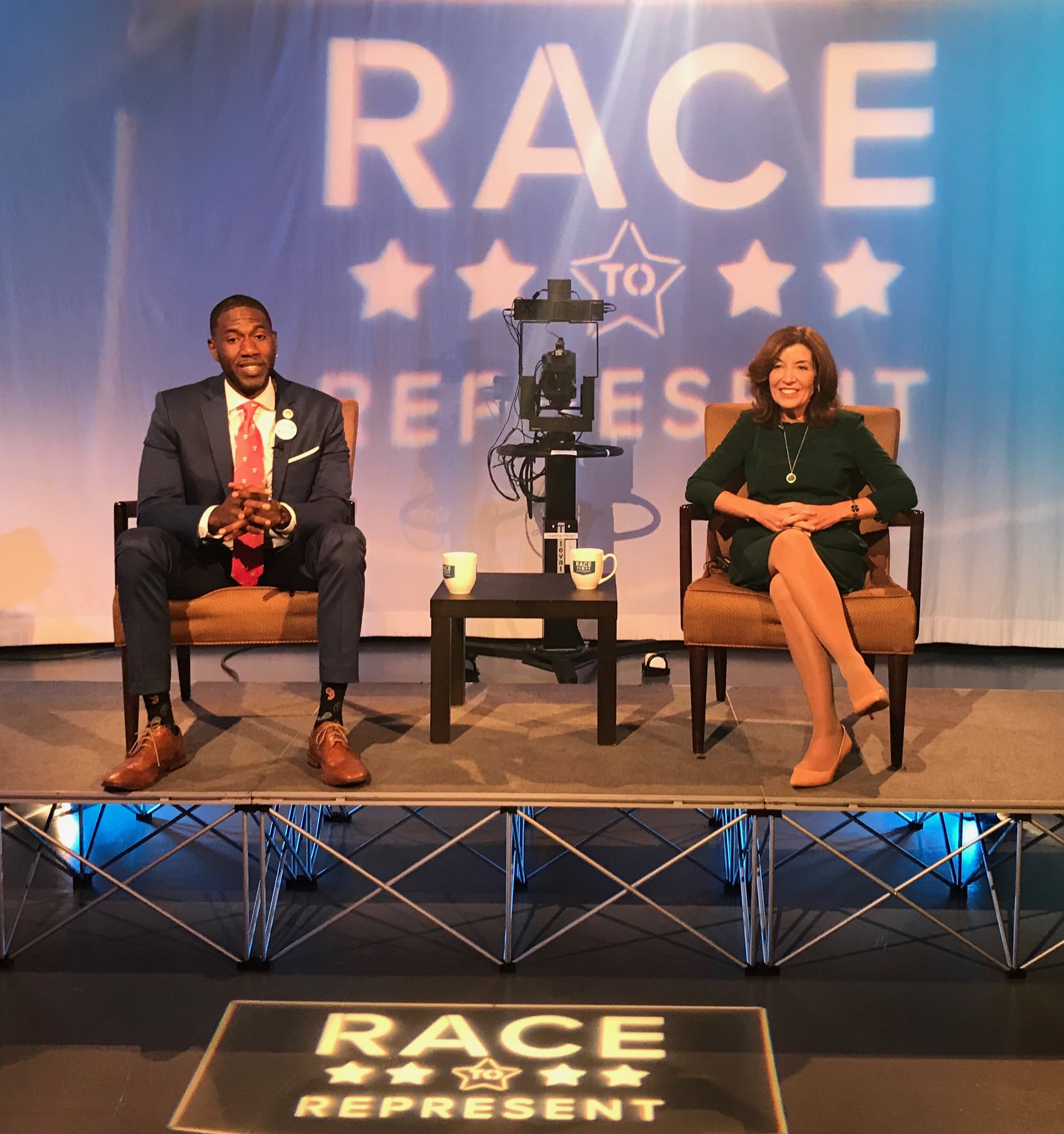What's The [Data] Point? 5,000 with Liz Glazer, Director of the Mayor’s Office of Criminal Justice

What's The [Data] Point? Episode 52 -- 5,000, with Liz Glazer, Director of the Mayor’s Office of Criminal Justice [You can download What's The [Data] Point? wherever you get your podcasts, including on iTunes]

Mayor Bill de Blasio has a plan to close the jails on Rikers Island, in part by reducing the overall city jail population to 5,000 detainees, down from about 8,000 now, which is down from well over 20,000 two decades ago. Liz Glazer, director of the Mayor’s Office of Criminal Justice, joined the podcast to discuss the administration’s criminal justice policies.
Listen to the conversation and let us know what you think: Ben Max of GG (@TweetBenMax), Maria Doulis of CBC (@MariaDoulis). Listen below or download wherever you get your podcasts!
***
by Ben Max, Gotham Gazette
@tweetBenMax @GothamGazette
Campaign Finance Board Report Shows Small Donors with Large 2017 Footprint

As a mayoral charter revision commission readies to release proposals that would, if approved by voters in November, reduce the impact of large donors in municipal elections, a report released Thursday by the New York City Campaign Finance Board highlights how small donors are increasingly playing a larger role in city elections.
The CFB’s 2017 post-election report examined last year’s citywide election, in which the three citywide positions, five borough presidents, and all 51 City Council seats were on the ballot. The CFB administers the city’s campaign finance law and its public matching funds program, which currently matches the first $175 of every qualifying donation at a 6-to-1 ratio, incentivizing candidates, especially those who lack deep pockets or access to moneyed donors, to run for election on grassroots campaigning and fundraising. The program is considered a national model and has been emulated in municipal elections in other states.
In 2017, the eighth citywide election under the program, small donors played a bigger role than they ever have before, the report found. About 73 percent of contributors to mayoral candidates were small donors, giving $175 or less. That number was 43 percent in the 2013 election cycle and 70 percent in 2009.
Mayor Bill de Blasio and his Republican general election opponent, state Assembly member Nicole Malliotakis, both participated in the public funds program last year. De Blasio made a concerted effort to court small donors for his reelection after having faced allegations -- which also prompted official investigations that closed with no charges filed -- that his administration took favorable actions for donors with city business who gave large contributions to his campaign and two extra-governmental nonprofits he created to promote his agenda.
Notably, though the number of small dollar contributions were overwhelming -- 13,767 out of 18,796 contributions to mayoral candidates -- they only accounted for $783,699 or 11 percent of the total value of fundraising by all mayoral candidates. For comparison, there were only 656 contributions of the maximum-allowed value -- $4,950 for the last cycle -- which accounted for $3.24 million or 45 percent of the total fundraising by mayoral candidates.
Participation in the public funds program was also widespread, with 84 percent of candidates opting in for the September primary and 64 percent participating in the general election. In 2013, 91 percent of primary candidates and 62 percent of general election candidates were participants, with the larger primary percentage than 2017 likely due to the greater number of open seats in that cycle. In 2017, for instance, five out of 41 City Council incumbents did not face a challenger in the primary or general election.
In total, the CFB doled out $17.7 million in public funds, $5.9 million of which went to de Blasio and Malliotakis. The report also found that City Council candidates got more than 50 percent of their funds from the public matching program.
“For 30 years, New York City’s Campaign Finance Program has shaped the landscape of city elections and strengthened New Yorkers’ relationship to their government," said Amy Loprest, CFB executive director, in a statement. “Our 2017 Post-Election Report highlights why our program continues to be a model for citizens across the country who want to reduce the impact of big money in politics.”
The report also includes several proposals to improve the campaign finance program through legislation. The board recommends lowering contribution limits, increasing the matching fund ratio and the cap on public funds, lowering both the threshold for citywide candidates to qualify for public funds and the lowest matchable contribution.
The CFB issued these same recommendations to the mayor’s charter revision commission in June, and the commission has taken some of them into consideration as it creates its final proposals, which will be released in the coming weeks and put before voters on Election Day in November. Among other suggestions, the commission will recommend lowering contribution limits for citywide candidates to $2,000 for those who participate in the public funds program and $3,500 for those who do not. The current limit is $5,100. The commission is also proposing increasing the ratio of matching funds to 8-to-1 and matching the first $250 of every contribution for citywide candidates. Under another proposal, the public funds cap would increase from 55 percent of the spending limit for a position to 75 percent.
The charter commission is set to meet on Tuesday to vote on the final language of questions that will be placed on the ballot for voters. Should any of the CFB’s recommendations fail to make the grade, they will likely be taken up by the City Council in the form of legislation or by a separate Council-convened charter commission that will start to hold public hearings in mid-September and is planning to put recommendations before voters in 2019.
***
by Samar Khurshid, senior reporter, Gotham Gazette
@samarkhurshid @GothamGazette
Hochul, Williams Outline Drastic Differences in Lieutenant Governor Debate

Jumaane Williams and Kathy Hochul (photo: Gotham Gazette)
New York City Council Member Jumaane Williams on Wednesday pledged to remake the lieutenant governor position he is seeking, as Lieutenant Governor Kathy Hochul defended her record and approach to the job, as well as Governor Andrew Cuomo’s tenure. The two Democrats were appearing in their only scheduled televised debate ahead of the September 13 vote.
The 30-minute debate, hosted by Manhattan Neighborhood Network (MNN) and moderated by Gotham Gazette editor Ben Max, aired Thursday evening on MNN, while also being live-streamed on the MNN website and posted on YouTube.
The two candidates not only discussed their differing views of the position they are seeking to fill, but also corruption in state government during the Cuomo-Hochul administration, economic development and their respective records as elected officials. Williams repeatedly criticized Hochul and Cuomo, while the incumbent touted major accomplishments of the last four years and beyond, saying she is proud of her partnership with Cuomo and what they have achieved.
Hochul, who became Cuomo’s running mate in 2014, is seeking a second term while the governor seeks a third. (Robert Duffy served during Cuomo’s first-term as lieutenant governor, and declined to seek a second term). The governor and lieutenant governor are nominated separately in party primaries, but run as a ticket in the general election.
During the debate, Williams critiqued Hochul, previously a one-term member of Congress from the Buffalo area, as a political insider and tied her to broader qualms about “establishment Democrats” like he said she is, repeating the “any blue just won't do” slogan Williams has used on the campaign trail to signify that Democrats must elect candidates from the progressive wing of the party. But the debate largely centered on the approach a lieutenant governor ought to adopt, especially vis-à-vis the governor.
Williams, allied with fellow insurgent candidate Cynthia Nixon, who is challenging Cuomo from the left, said he holds a “fundamentally different vision” of the position than Hochul, lamenting the current iteration of the lieutenant governor job as one in which the official “does what the governor says to do.”
“I reject that,” he continued. “I believe the lieutenant governor should be the eyes, the ears, and the voice of the people of the state of New York.”
“The role of lieutenant governor is to be experienced and prepared to step in as governor should the need arise,” Hochul said in her first remarks of the debate, several times describing herself as a steady-handed leader who knows government and “gets things done.”
She also defended acting in lockstep with Cuomo, and wouldn’t — or couldn’t — name a time at which she had disagreed with him or changed his mind on a policy.
“This state is better served when you have the two executive officials, the governor and lieutenant governor, working in partnership,” she told reporters after the debate. She said during the debate and after it that she has had private conversations with the governor that she is keeping private, but that she is not afraid to speak up when she has something to say.
On a host of issues, Williams said Cuomo’s administration had mishandled policy while Hochul was missing in action. As in the past, he said that should he be elected governor, he’s play role akin to New York City's public advocate — a contrast to what Williams said has in recent years been purely ceremonial, giving Cuomo a “rubber stamp” on his agenda and traveling around the state cutting ribbons.
“When a ribbon is cut that means something good is happening,” Hochul said in response, going on to reference the act of opening up a drug treatment facility.
Hochul said lieutenant governors were meant to partner with the governor and the Legislature, not act as a thorn in their sides. And Hochul said she has not merely followed Cuomo’s orders during her tenure.
"As a strong woman, I do not do what men tell me to do,” she said.
But when asked by the moderator for examples of changing the governor’s mind on an issue, Hochul did not cite any, saying her views have largely been in line with Cuomo’s.
During the debate the lieutenant governor highlighted accomplishments like a law that will raise the minimum wage to $15 per hour in many areas of the state and a paid family leave law, as well as efforts to create jobs, and to fight the opioid epidemic and sexual assault on college campuses. When Williams said that activists like himself had pushed Cuomo, Hochul, and others to the “Fight for $15” campaign, she countered that government is where things get done, and she’s proud of what has been passed, especially given Republican control of the state Senate.
Under Cuomo, Hochul’s portfolio has included high-profile economic development programs, some of which have been plagued by corruption. Williams made multiple references to these scandals, which have recently seen close allies and donors to the governor convicted of federal crimes.
“Too many of those have been actually massive failures," Williams said of economic development programs. "What's sad is the lieutenant governor's office hasn't been used to highlight that."
Hochul countered, including with reference to Buffalo, where the Cuomo administration has made its largest investments, some of which were taken advantage of.
“We've empowered the local people to chart their own vision…and it has been an overwhelming success,” Hochul said, in apparent reference to the Regional Economic Development Councils and other programs she has helped shepherd. “By any metric, Governor Cuomo’s economic development programs have been successful.”
She added that there have been measures put in place to prevent against corruption and cronyism in economic development initiatives. "We have zero tolerance for anyone who abuses the trust that they have been given," she said, though she did not express direct support for additional anti-corruption measures related to economic development for which watchdogs and some legislators have called, dismissing some as sought by Republican legislators who want to be able to hand out more pork spending to their districts.
Hochul, when asked by the moderator about her apparent lack of involvement as the governor negotiated new anti-sexual harassment policy with other male elected officials behind closed doors, said she did play a meaningful role as the state passed new laws. Those laws, included in the state budget agreement reached in March, passed amid criticism from survivors of workplace sexual harassment for not including women in the legislative process and a lack of public hearings.
“I was very involved in those conversations,” Hochul said. “I was there helping chart the course that the state ended up adopting.”
Williams was asked about promising to be a bold, tell-it-like-it-is lieutenant governor, yet abstaining on more than 200 votes in the City Council, not choosing to vote yes or no, despite no apparent conflicts of interest. He said that many had been land use decisions that he wanted to register his discomfort about while being “collegial” with his Council colleagues.
While neither candidate used as fodder certain high-profile, contentious campaign issues — such as Williams’ past personal financial troubles or prior stated personal opposition to abortion and same-sex marriage; Hochul’s role in thwarting an effort to give driver’s licenses to undocumented New Yorkers or past support from the National Rifle Association (NRA) — the debate did include litigation of recent campaign trail controversies, with Williams accusing Hochul’s campaign of employing racially insensitive and classist tropes about him and his past financial struggles, which have included a home foreclosure and failed restaurant.
In addition, Williams referred to former state Democratic Party chair Judith Hope, who in a fundraising email for Hochul labeled Williams a “young charismatic black man,” and the Hochul campaign’s advertisements that he said depicted him as an “angry black man.” Hochul denied her campaign played a part in writing the email and said she can’t control what supporters say.
Hochul also denied her campaign has made use of race and class to attack Williams. “I don’t believe there are [racial overtones]. I believe that we’re running our race that talks about our records and that is what I’m going to continue to do.”
In her closing statement, Hochul made the case the administration's accomplishments earned her a second term so that she and Cuomo can continue to serve as a “check” on President Donald Trump, and lead the “resistance” against him.
“I’m going to continue what I’ve done, helping elect Democrats to the New York State Senate, but also to Congress,” she said. “We, as New York State, have a special responsibility — a moral obligation — to stand up and fight back.”
For his part, Williams emphasized in closing that it was not only his race and ability to bring diversity to state government that made him worthy of voters’ support, but also the issues he would champion if elected and how he would approach the role of lieutenant governor.
"Identity politics is important,” he said. “But that cannot be the only thing. That's the gravy. We have to have a meal.”
Toward the end of his post-debate talk with reporters, Williams expressed willingness to participate in another televised debate ahead of the September 13 primary, and criticized Hochul for not agreeing to additional debates. Hochul, who on NY1 said she wanted to debate Williams on the network, backed out of that debate, leaving Williams with the alloted time to appear with anchor Errol Louis in a segment that aired last week.
[Watch the Hochul-Williams debate on YouTube]
***
by Sam Raskin
@samraskinz @GothamGazette




